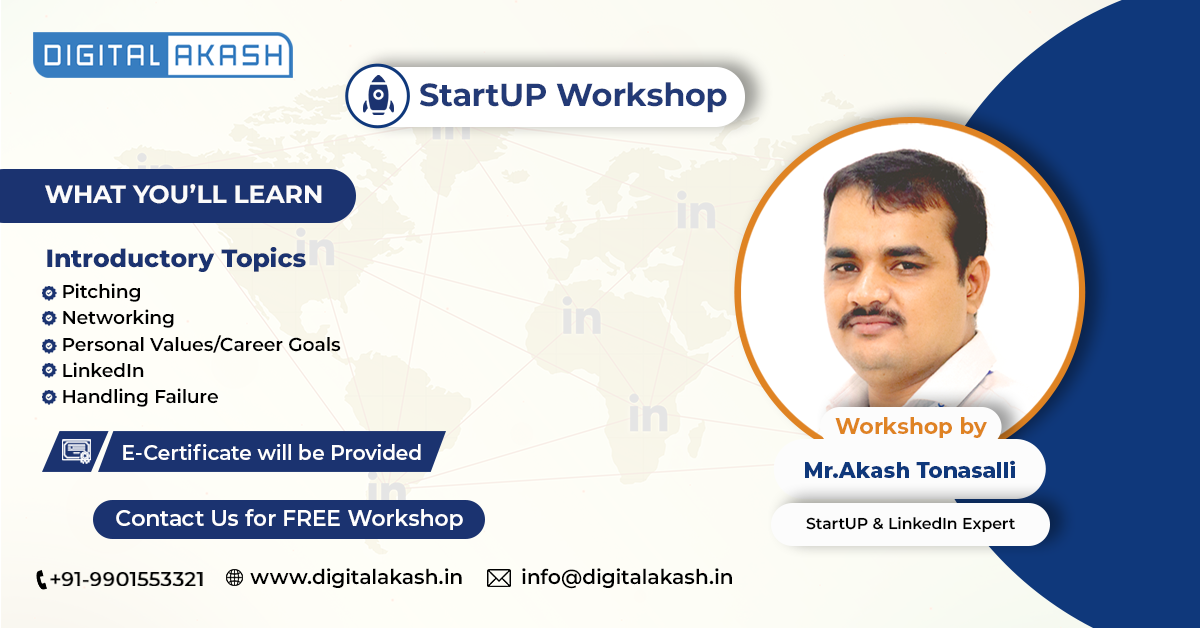 Startup Workshop
Startup Workshop
A startup workshop can be a valuable experience for individuals and teams who are interested in starting a new business. Here are some steps for conducting a successful startup workshop:
Introduction: Begin the workshop by introducing yourself and the purpose of the workshop, which is to provide attendees with the tools and knowledge they need to start and grow a successful business.
Overview of entrepreneurship: Discuss the basics of entrepreneurship and the key elements of starting a successful business, including idea generation, market research, and business planning.
Customer discovery: Explain the importance of understanding your target customer and provide tips on how to conduct customer research to validate your business idea.
Business model canvas: Discuss the business model canvas as a tool for visualizing and validating your business idea. Guide attendees through the process of creating a business model canvas for their own business idea.
Marketing and sales: Discuss the importance of marketing and sales in the success of a business and provide tips on how to effectively reach and engage customers.
Funding: Discuss the different options for funding a startup, including angel investing, venture capital, and crowdfunding. Explain the pros and cons of each option and provide tips on how to effectively pitch your business to potential investors.
Scaling: Discuss the importance of scalability and provide tips on how to grow your business and achieve long-term success.
Q&A session: Allow time for attendees to ask questions and discuss any challenges they’re facing with their startup efforts.
Benefits of Learning from a Startup Workshop:
Practical Knowledge:
- Hands-On Learning: Workshops often involve interactive exercises and case studies, allowing participants to apply theoretical knowledge in practical scenarios.
Networking Opportunities:
- Industry Connections: Participants can build a network of mentors, fellow entrepreneurs, and potential collaborators, creating valuable connections.
Skill Development:
- Entrepreneurial Skills: Workshops focus on developing specific skills crucial for entrepreneurial success, such as problem-solving, decision-making, and communication.
Idea Validation:
- Feedback and Validation: Workshops provide a platform for participants to receive feedback on their business ideas, helping them refine and validate their concepts.
Access to Resources:
- Resource Networks: Workshops often connect participants with resources, including incubators, accelerators, and funding opportunities, that can further support their startup journey.
Confidence Building:
- Pitching Skills: Learning how to pitch ideas and interact with potential investors or partners boosts participants’ confidence in presenting their business concepts.
Adaptability and Resilience:
- Navigating Challenges: Workshops may address common challenges faced by startups, helping participants develop resilience and adaptability in the dynamic business environment.
Importance of Startup Workshop
Knowledge Transfer:
- Learning from Experts: Workshops often feature experienced entrepreneurs, industry professionals, and subject matter experts who share their insights, experiences, and best practices. This direct knowledge transfer is invaluable for individuals who are new to the entrepreneurial landscape.
Skill Development:
- Hands-On Training: Workshops provide practical, hands-on training that goes beyond theoretical knowledge. Participants engage in activities and exercises that help them develop the specific skills needed for entrepreneurship, such as problem-solving, decision-making, and effective communication.
Idea Validation:
- Feedback and Validation: Workshops offer a platform for participants to present their business ideas and receive constructive feedback. This process helps in refining and validating entrepreneurial concepts before investing significant time and resources.
Networking Opportunities:
- Building a Support System: Workshops facilitate networking with mentors, fellow entrepreneurs, investors, and industry experts. These connections can be crucial for obtaining advice, support, and potential collaborations, creating a valuable support system.
Access to Resources:
- Exposure to Ecosystem: Participants gain insights into the broader entrepreneurial ecosystem, including access to incubators, accelerators, funding opportunities, and other resources that can help in the growth of their startups.
FAQs about Startup Workshops:
1. What is a Startup Workshop?
A Startup Workshop is a structured event or program designed to provide aspiring entrepreneurs with the knowledge, skills, and tools needed to start and grow a successful business. These workshops often cover various aspects of entrepreneurship, such as ideation, business planning, marketing, finance, and pitch development.
2. Why is a Startup Workshop important?
- Knowledge Transfer: Workshops facilitate the transfer of essential knowledge from experienced professionals to aspiring entrepreneurs.
- Skill Development: They offer hands-on learning experiences to develop practical skills necessary for running a startup.
- Networking Opportunities: Participants can connect with mentors, fellow entrepreneurs, and industry experts, expanding their network.
- Idea Validation: Workshops provide a platform to validate business ideas through discussions, feedback, and interaction.
3. Who should attend a Startup Workshop?
- Aspiring Entrepreneurs: Individuals with a business idea or those looking to start their own venture.
- Early-Stage Startups: Founders and teams seeking guidance and support in the initial stages of their business.
4. What topics are typically covered in a Startup Workshop?
- Business Ideation: Generating and refining business ideas.
- Business Planning: Developing a comprehensive business plan.
- Market Research: Understanding target markets and customer needs.
- Marketing Strategies: Creating effective marketing plans.
- Financial Management: Budgeting, financial planning, and funding options.
- Pitching: Crafting and delivering compelling pitches to investors.

